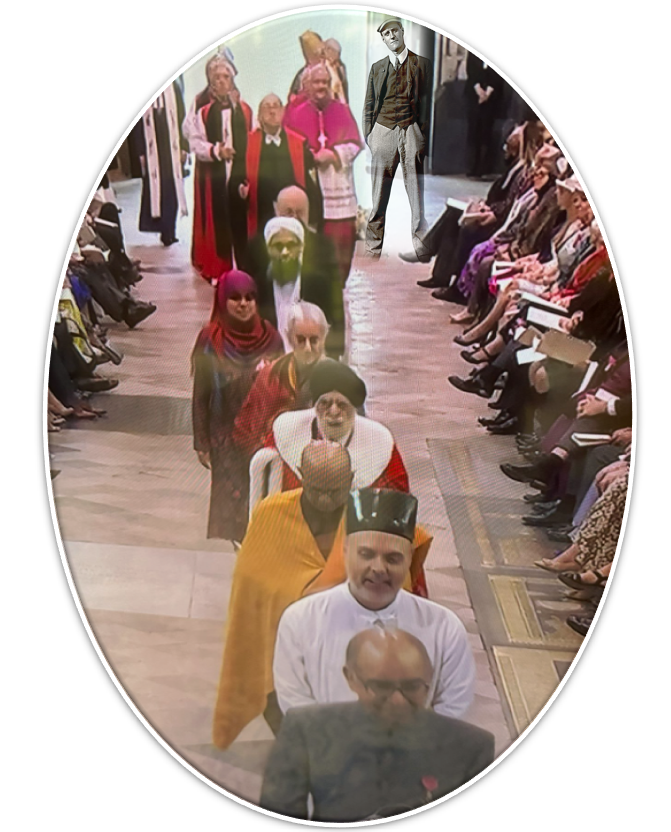1. Unlike most modern states, including the Republic of Ireland, the precariously United Kingdom of Great Britain and Northern Ireland has no written constitution. Yet, as the coronation of King Charles III reaffirmed on 6 May 2023, it does have a foundational book (or Book). Following a custom dating from 1689, the first of many gifts presented to the King was a new printing of the King James Bible (1611). Produced by Oxford University Press, on commission for the Archbishop of Canterbury, it was handbound in red leather and decorated in gold leaf by London bookbinders Shepherds, Sangorski & Sutcliffe.

2. Presenting it to the King, the Moderator of the General Assembly of the Church of Scotland, Rev Dr Iain Greenshields, declared:
Sir: to keep you ever mindful of the law and the Gospel of God
as the Rule for the whole life and government of Christian Princes, receive this Book, the most valuable thing that this world affords. Here is Wisdom; This is the royal Law; These are the lively Oracles of God.
The final four clauses repeat the words used at the same point in the coronation of Elizabeth II in 1953. The last statement is a pastiche of Acts 7:38 (‘lively oracles’) and various references to the ‘Oracles of God’ (Romans 3:2, Hebrews 5:12, and 1 Peter 4:11).
3. Following the book presentation, Justin Welby, the Archbishop of Canterbury, administered the Coronation Oath, which also dates from the late-17th century — it was established under the Coronation Oath Act 1688. Among other things, the King assented to the following:
Will you to the utmost of your power maintain the Laws of God and the true profession of the Gospel? Will you to the utmost of your power maintain in the United Kingdom the Protestant Reformed Religion established by law? Will you maintain and preserve inviolably the settlement of the Church of England, and the doctrine, worship, discipline, and government thereof, as by law established in England? And will you preserve unto the Bishops and Clergy of England, and to the Churches there committed to their charge, all such rights and privileges as by law do or shall appertain to them or any of them?
4. These words sit uneasily with the accommodating language Welby used to introduce the oath. After affirming the King’s duty to uphold the established (i.e. state) Church of England and the ‘true profession of the Gospel’, he added, ‘and, in so doing, to foster an environment in which people of all faiths and beliefs may live freely.’ This nod to modernity echoed Charles’s own long-standing commitment to recognizing the religious diversity of the UK and drew attention to the presence of non-Christian faith leaders in the ceremony. These included representatives of Jewish, Sunni and Shia Muslim, Sikh, Buddhist, Hindu, Jain, Bahá’í, and Zoroastrian traditions (see image above).
5. If this awkward gesture of inclusiveness from within the 17th-century language of Anglican supremacy speaks to the character of statist multiculturalism in the UK, the conspicuous non-recognition of those with no faith points to the disjunction between the deep history of the coronation ceremony and the realities of contemporary Britain. In 2021, for the first time in the census of England and Wales, less than half the population (46.2%, 27.5 million people) identified as Christian, down just over 13% since 2011; ‘no religion’ was the second most popular response (37.2%, or 22.2 million people). Moreover, according to the latest World Values Survey, 48% of the UK population do not believe in God, putting the country sixth in the world on this measure. Taken in order, only China, Sweden, Japan, South Korea, and Norway rank higher when it comes to non-believers.
6. Adding a copy of James Joyce’s Finnegans Wake (1939) to the array of coronation gifts would be a good first step towards acknowledging these realities. The reason? Reflecting the unlimited scale of Joyce’s ambition, the Wake is not just his never-finished, ever-changing secular book of Liffley ‘moracles’ (617). It is an iconic anti-Book: Joyce’s answer to all those who, like the Wake’s Shaun-figure, insist on the supremacy and finality of any one orthodox philopoliticoreligious artefact of writing. Here is Shaun asserting his own mono-megalomaniacal Bookishness, while denouncing his feckless, subversive twin brother Shem, ‘the Penman’ (125):
my trifolium librotto, the authordux Book of Lief, would, if given to daylight, (I hold a most incredible faith about it) far exceed what that bogus bolshy of a shame, my soamheis brother, Gaoy Fecks, is conversant with in audible black and prink. (425)
Though the Wake challenges the Catholic foundations of the Irish republic, as inscribed in the preamble to its constitution (‘the prestatute in our charter’, 117), Shaun’s invocation of Guy Fawkes, the Catholic leader of the 1605 Gunpowder plot, indicates that Joyce’s anarchically anti-statist secular proclivities were ecumenical. In fact, no fetishized ‘idol worts’ (378) are safe in his anti-Book of ‘ourth’ (18, and see ‘Fourth Proposition‘).



